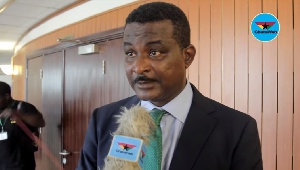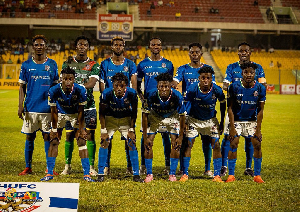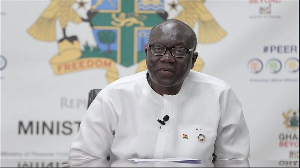Former Deputy Minister for Finance, Kweku Ricketts Hagan has painted a gloomy picture for the country, saying investor confidence is waning as Ghanaians continue to lose trust in the Judicial system.
The MP for Cape South believes the aftermath of the election petition ruling by the Supreme Court has scared investors despite the Akufo-Addo government’s projections that investors see Ghana as a safe haven for doing business.
The apex court last Thursday in a unanimous decision threw out John Mahama’s petition to get the Electoral Commission (EC) to re-run elections between him and President Akufo-Addo after he petitioned the court over electoral fraud.
But a judgment delivered by Chief Justice Kwasi Anin Yeboah held Nana Akufo-Addo as validly elected president. The court said the petitioner, John Mahama, did not demonstrate in any way how the alleged errors made by the first respondent, the EC, affected the presidential election results.
But addressing the country from his Cantonments office, Mahama rejected the ruling, saying despite ” an overwhelming number of Ghanaians, anxious for answers from the Chairperson of the Electoral Commission as the Returning Officer of the December 2020 Presidential Election” she was ” blocked time and again by a protective cordon and firewall” and prevented by the court from testifying.
“Much as I am aware that we are legally bound by the decision of the Supreme Court, I disagree with the process of trial and ruling of the court,” Mahama said while addresing the nation.
It is for this reason that Ricketts Hagan said he is convinced investor confidence is waning in the country, explaining that the reaction of most Ghanaians after the court ruling indicated the EC boss, Jean Mensa, was needlessly protected from accounting to Ghanaians to clear all doubts of electoral fraud or rigging.
“Investor confidence has reduced and they won’t risk investing in the country’s economy at a time people have no trust in the judicial service,” he told host Kwame Minkah in Akan.
Ricketts Hagan further explained the rejection of the verdict by former president John Mahama has sent a signal that the Judiciary cannot be trusted and thus, investors will rather choose to invest in a country where the judicial service can be trusted.
“If the investors realise the court can shield certain people, they’ll think they won’t get justice in the law court when they do business with you which results in a misunderstanding and both of you decide to resolve in the court,” he said.
To the former minister, this will negatively affect the economic indicators such that the recovery the government is expecting after the COVID-19 pandemic hit the economy could delay.
Meanwhile, the Akufo-Addo government is positive there will be an economic turnaround despite projections that the country’s debt will keep soaring in the midst of the COVID-19 spread.
President Nana Akufo-Addo on Tuesday said the country’s Gross domestic product (GDP) will grow by five per cent (5%) by the end of 2021.
The president made this knownwhen he delivered his first state of the nation address (SONA) of his second term in Parliament.
Akufo-Addo stated although the COVID-19 pandemic had affected the economic outlook of the country, his eceonomic recovery agenda will bring about some ease.
He said, among other things, that his government would lead a “rapid industrialisation” drive that will result in “a value added economy” which will be fuelled by one of his flagship programmes, the One District, One Factory (1D1F).
“We expect GDP growth to rebound strongly this year to nearly 5 percent; above the IMF’s 2021 January projection of 3.2 percent for sub-Saharan Africa for 2021,” the President said and announced 232 projects under the 1D1F are at various stages of completion which would contribute to boosting the industrialization sector.
He also expressed confidence the commencement of the coronavirus vaccine rollout will contribute to that.
“Government expects economic activity, which has already picked up, to do so even further following the ongoing vaccination exercise and the easing of restrictions put in place to curb the effects of the disease.”
Akufo-Addo’s projections come at a time international ratings agency, Fitch, has said in its latest findings that Ghana’s debt will hit approximately 75 percent of Gross Domestic Product from 2024.
In its report, “Energy Sector Debt a Risk to Ghana’s Post-Pandemic Debt Trajectory”, Fitch noted the debt will continue to rise in 2021 and 2022 due to high COVID-19 pandemic-related spending and the realisation of energy sector liabilities.
Fitch affirmed Ghana’s sovereign rating (B/Stable) in October 2020, on an expectation of a gradual recovery, both in economic performance and fiscal revenue following the pandemic shock, the availability of external and domestic financing sources, and the eventual stabilisation of debt/GDP.
The Fitch Report said “However, Ghana’s public finances are complicated by a history of domestic arrears and by contingent liabilities that will continue to add to its public debt stock”.
It also said the country’s energy sector faces both a stock of debt outstanding and ongoing losses that is due to inefficient operational environment and wasteful tariff structure.
This some energy experts are raising fears of a probable collapse of the power sector that could have significant effect on the economy.
Business News of Wednesday, 10 March 2021
Source: myxyzonline.com













